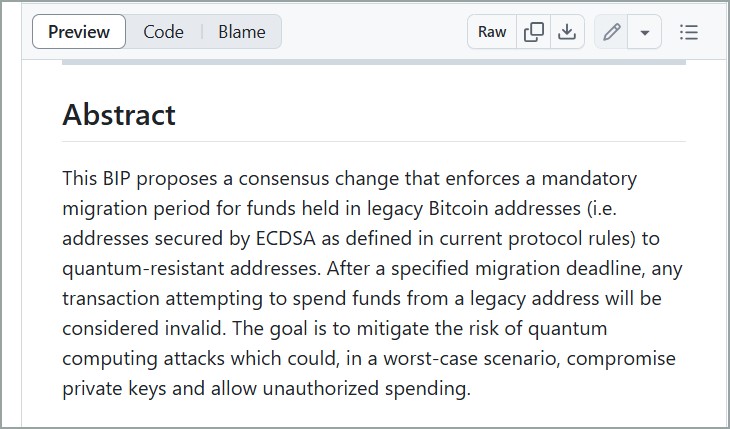Bitcoin developer Agustin Cruz has proposed what could become one of the most consequential upgrades in the network’s history—a hard fork designed to transition BTC away from legacy cryptographic standards vulnerable to quantum computing. The proposal, titled the Quantum-Resistant Address Migration Protocol (QRAMP), was submitted as a draft Bitcoin Improvement Proposal (BIP) and suggests a network-wide migration to post-quantum secure wallet infrastructure.
At the core of the proposal is a plan to render coins held in addresses secured by the existing ECDSA (Elliptic Curve Digital Signature Algorithm) unspendable after a specified block height. This would effectively compel holders to migrate their assets to quantum-resistant addresses, as nodes running updated software would reject any attempt to transact from vulnerable legacy wallets.

The urgency behind QRAMP stems from the accelerating pace of quantum computing research. Quantum computers leverage qubits—quantum bits that can exist in multiple states simultaneously—to process information in ways that vastly outpace classical machines.
While large-scale, fully capable quantum computers are still under development, the crypto community is beginning to consider the long-term implications of a world where such machines could crack traditional encryption standards.
Cruz’s proposal is one of the first formal attempts within the Bitcoin ecosystem to confront this looming risk head-on. If adopted, it could set a precedent for future-proofing not only Bitcoin, but also other blockchain networks that rely on cryptographic schemes vulnerable to quantum breakthroughs.
Community Faces Tough Call for Quantum-Safe Fork
The path to implementing a quantum-resistant Bitcoin may not be straightforward. Cruz’s QRAMP proposal calls for a hard fork—a fundamental change to the Bitcoin protocol that would render older versions of the software incompatible with the updated network. While technically feasible, history has shown that achieving community-wide consensus for such changes is no small feat.
Currently, Bitcoin’s security framework is built around algorithms like SHA-256 for mining and ECDSA for transaction signatures. While coins stored in untouched legacy wallets retain a level of protection, those that have transacted publicly have exposed their cryptographic keys—an exposure that, in a post-quantum scenario, could make them susceptible to attack.
Cruz notes that these vulnerabilities would only become critical if quantum computers advance to a level capable of breaking current cryptographic standards. Yet preparing for that possibility would require broad community agreement to hard fork the Bitcoin network—an idea that historically faces deep scrutiny and resistance from Bitcoin’s decentralized base.
Quantum-Safe Alternatives Are Emerging
Cruz’s proposal isn’t the only attempt to address the looming threat of quantum computing. In recent months, Canadian startup BTQ has introduced a quantum-focused approach that reimagines Bitcoin’s core consensus mechanism. The company’s research proposes replacing Bitcoin’s Proof-of-Work (PoW) model with a system known as Coarse-Grained Boson Sampling (CGBS).
Unlike PoW, which relies on energy-intensive hash functions solved by ASIC miners, CGBS uses bosons—light particles—to produce quantum-generated samples that represent the state of the blockchain. Theoretically, this would allow for a form of consensus that is both more secure against quantum attacks and far less dependent on electricity-intensive computation.
Yet, like QRAMP, BTQ’s proposal would require a hard fork and demand sweeping infrastructure changes. Miners would need to abandon ASIC rigs in favor of quantum-compatible hardware, and the broader network—including nodes and wallets—would need to adapt to an entirely new system. The scale of such a transition remains a major barrier to implementation.
As quantum computing moves from theory toward reality, Bitcoin faces a growing need to consider its long-term cryptographic resilience. Whether through QRAMP, alternative consensus models like BTQ’s, or future proposals, the debate around quantum preparedness is no longer theoretical. Still, any attempt to make such changes—particularly through a hard fork—will require strong community alignment, technical clarity, and a delicate balance between proactive defense and preserving Bitcoin’s foundational principles.
Quick Facts
- Developer Agustin Cruz has proposed a hard fork to migrate Bitcoin to quantum-resistant cryptography.
- The proposal aims to protect against potential future quantum computing attacks on Bitcoin’s current ECDSA encryption.
- Approximately 25% of Bitcoins are considered vulnerable to quantum attacks due to exposed public keys.
- Implementing such a hard fork would require widespread consensus and careful planning within the Bitcoin community.





